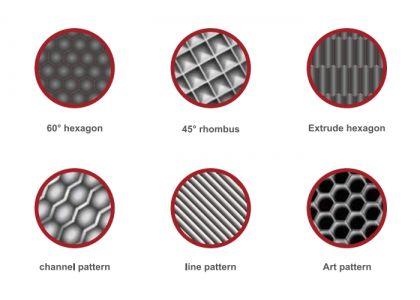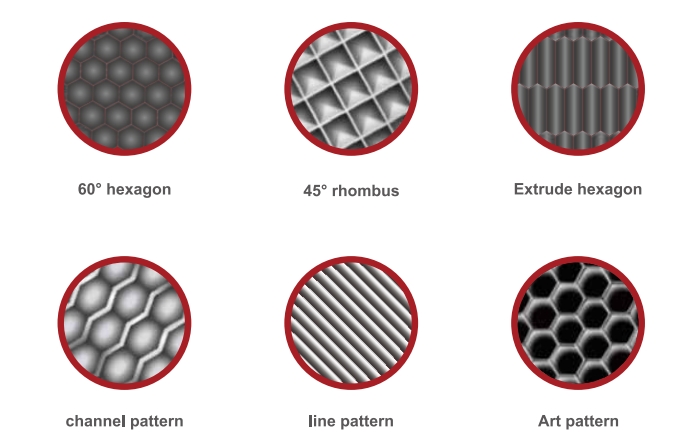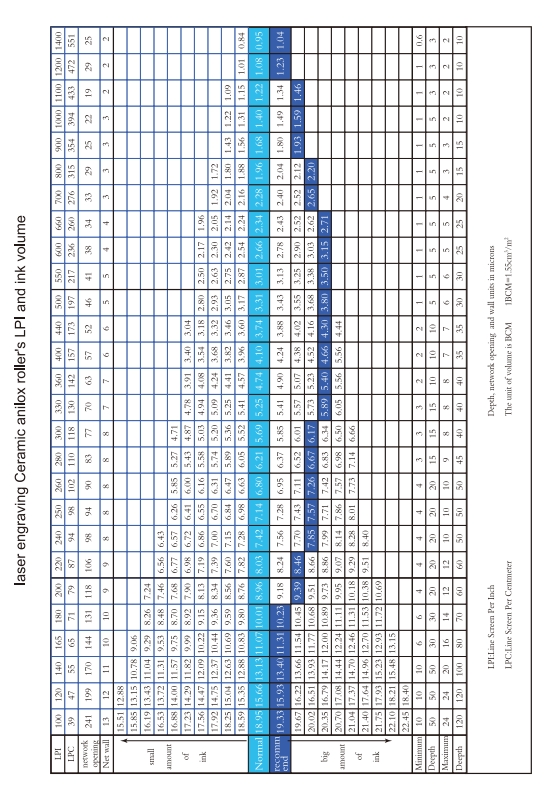Jctprint Machinery Co., Ltd

Choosing the right anilox cells and anilox lineatura (LPI) is one of the most important decisions for flexo printers and coating applications. The wrong choice can lead to excessive ink use, dot gain, weak colors, or high waste. The right choice, however, means:
1.Stable and consistent ink transfer
2.Higher print resolution
3.Reduced downtime from cleaning and replacement
4.Lower operating costs
This guide provides practical, step-by-step advice for buyers who want to optimize their printing press performance.

Anilox cells are the tiny engraved cavities on the surface of an anilox roller or sleeve. They control how much ink is carried and transferred to the plate.
Key parameters:
1.Cell Shape
Hexagonal – Standard, good balance of ink transfer and release.
Elongated / Trihelical – Better ink release, used for coatings or heavy solids.
Pyramidal / Hybrid – Designed for high-resolution graphics, better control with UV inks.
2.Cell Volume (BCM/cm²) – Defines the ink-carrying capacity.
High volume = more ink, suitable for coatings or solid areas.
Low volume = less ink, suitable for fine text and halftones.
Buyer Tip: If you print flexible packaging with fine details, go for lower cell volume + higher lineatura. If you print corrugated or coatings, choose higher cell volume + lower lineatura.

Anilox lineatura refers to the number of cells per inch (LPI). It impacts resolution, detail, and ink coverage.
| Lineatura (LPI) | Cell Volume (BCM/cm²) | Best For |
|---|---|---|
| 200 – 400 | 8 – 12 | Flood coatings, corrugated, heavy ink laydown |
| 400 – 800 | 4 – 8 | General packaging, mid-resolution graphics |
| 800 – 1200 | 2 – 4 | Labels, flexible packaging, fine text, barcodes |
| 1200+ | 1 – 2.5 | High-resolution films, process printing, vignettes |
Buyer Tip: Always match your anilox lineatura to the plate screen ruling (lpi/dpi). For example:
150 dpi plate → 450–600 LPI anilox
200 dpi plate → 600–800 LPI anilox
300 dpi plate → 1000+ LPI anilox
Here are some real-world examples to help you choose correctly:
1.Corrugated Board (Kraft paper)
Challenge: absorbent surface, strong colors needed
Solution: 250–400 LPI, 8–10 BCM
2.Flexible Packaging Film (PE, PET)
Challenge: smooth surface, fine details required
Solution: 800–1200 LPI, 2–3 BCM
3.Labels (wine, cosmetics, pharma)
Challenge: sharp text, barcodes, high resolution
Solution: 1000+ LPI, 1.5–2.5 BCM
4.Overprint Varnish / Coatings
Challenge: large volume coverage, even layer
Solution: 200–400 LPI, 10–12 BCM
Choosing too low lineatura for fine graphics → results in dot gain, blurred images.
Always check plate resolution before ordering.
Overestimating cell volume → causes flooding, drying issues, and high ink consumption.
Ask supplier for recommended BCM charts.
Not considering ink type → UV inks require different cell geometry compared to water-based inks.
Discuss ink compatibility with your supplier.
Ignoring cleaning & maintenance → fine LPI rollers clog faster.
Schedule regular ultrasonic cleaning for long life.
Define your application (labels, corrugated, film, coating).
Match lineatura to your plate resolution.
Choose cell volume based on ink coverage.
Verify cell shape for your ink type (UV, water, solvent).
Partner with a supplier that offers quality testing and volume measurement.
At JCTPRINT, we specialize in manufacturing ceramic anilox rollers and sleeves using:
Oerlikon Metco ceramic coating system (high wear resistance)
ALE laser engraving equipment (precise cell geometry)
AniCAM volume inspection (strict quality control)
Our rollers are exported to 40+ countries, serving flexo printers, coating converters, and packaging companies. Whether you need high lineatura for film printing or high-volume cells for coatings, we can provide the right solution.
The right choice of anilox cells and lineatura can dramatically improve your print quality, reduce costs, and extend roller life. By applying the selection rules in this guide, you can confidently choose the best option for your press.
Learn more about our ceramic anilox rollers, anilox sleeves, and other flexo printing rollers to find the right solution for your press.